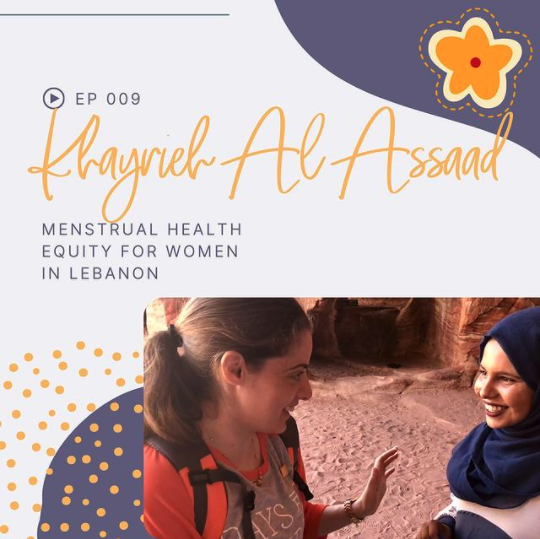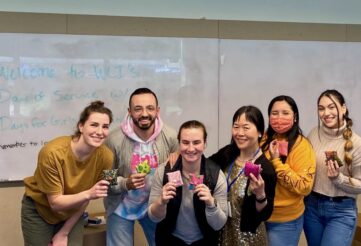Episode 009: Menstrual Health Equity for Women in Lebanon with Khayrieh Al Assaad

SUBSCRIBE AND LEAVE A REVIEW: APPLE PODCASTS | SPOTIFY | STITCHER | RSS
Khayrieh Al Assaad is a women’s rights advocate, civil engineer and businesswoman from Akkar Al Atika in North Lebanon. Since joining DfG as our Lebanon Country Representative in 2017, she has led the distribution of more than 10,000 DfG Kits for Syrian refugee women and more than 3,000 Kits for Lebanese women affected by last summer’s Beirut explosions. She also works as a site engineer, coaches a women’s basketball team (started by the U.S. Embassy in Lebanon) and serves as a youth advisor for the U.S. Embassy. We are so lucky to have her in the DFG family for the past six years!
In this second episode of our International Women’s Day series, Khayrieh sits down to talk with us about her ongoing work with refugee communities in Lebanon, how her team pivoted to meet the needs of even more menstruators after the Beirut explosions, and the importance of overcoming widespread menstrual stigma to reach women and girls.
Highlights:
- The ongoing challenges faced by Syrian an Palestinian refugee women and girls in Lebanon
- Launching a menstruator-first humanitarian response when Beirut was hit by two explosions last August
- Pervasive menstrual taboos in Lebanon
- What inspires her to overcome challenges and continue this work
Connect:
Email: khayrieh@daysforgirls.org
Bio:
Khayrieh Al Assaad is a women’s rights advocate, civil engineer and businesswoman from Akkar Al Atika, North Lebanon. As DfG Lebanon Country Representative, she has led the distribution of more than 10,000 DfG Kits for Syrian refugee women and more than 3,000 Kits for Lebanese women affected by Beirut explosion.
Khayrieh has been with Days for Girls since 2017. A committed and passionate woman, she also works as a site engineer, coaches a women’s basketball team (started by the U.S. Embassy in Lebanon) and serves as a youth advisor for the U.S. Embassy.
Before joining Days for Girls, Khayrieh worked as a project manager for multiple women and youth empowerment projects in Lebanon, taught English in Turkey and led skills-based education courses for thousands of refugee students in Akkar.
Khayrieh’s diverse experiences continue to inform her work as the leader of DfG Lebanon – and help her fulfill her passion to uplift women and girls throughout the country.
Support the show (http://bit.ly/donatetodfg)
Transcript:
Jessica Williams 0:02
Welcome to the Days for Girls Podcast, a show about breaking barriers for women and girls around the world. I'm your host, Jessica Williams, Chief Communications Officer at Days for Girls International. At Days for Girls, we believe in a world where periods are never a problem.
We are on a mission to shatter the stigma and limitations associated with menstruation by increasing access to sustainable period products menstrual health education for all people with periods. Today's conversation is with Khayrieh Al Assaad. Khayrieh is a women's rights advocate, civil engineer and businesswoman from North Lebanon. As Days for Girls Lebanon Country Representative, she has led the distribution of more than 10,000 DFG kits for Syrian refugee women and more than 3000 kits for Lebanese women affected by the Beirut explosions. She is a committed and passionate woman who also works as a site engineer, coaches a women's basketball team and serves as a youth advisor for the US Embassy.
Today's conversation is part of our special series for International Women's Day. If you would like to support Khayrieh, please go to www.daysforgirls.org/lebanon where you can donate specifically to the menstrual health equity campaign for women in Lebanon. Thank you so much for your time. Now let's go on to the show! Welcome to the Days for Girls podcast, it's so lovely to have you here today. Thank you for coming on the show.
Khayrieh Al Assaad 1:35
Thank you so much.
Jessica Williams 1:36
Yeah, absolutely. So Khayrieh, how long have you been working with Days for Girls?
Khayrieh Al Assaad 1:43
Since 2015? Yes, I was a discussion coordinator of Islam International NGO in Lebanon, and then I heard about Days for Girls. And then I applied for this position. And I got it!
Jessica Williams 2:01
Oh, yay. That's great. And so you've been here a while and you know, I came on board last year, and you are a hustler. And you work so hard, because I've seen all of the projects that you are committed to and all of your incredible work that you've done, especially in light of some really bad situations going on. And so, you know, I'm really excited to share with everybody today, your work. So can you talk about that? Can you talk about your work to deliver menstrual products and education? In Lebanon? Like who are you serving? How are you going about that?
Khayrieh Al Assaad 2:40
Yes, folks like that it was something we try to make our best to help people in Lebanon, not only refugees, but also the Lebanese. It’s gonna be a different situation because there are a big number of Palestinian refugees. And since 2011, hosting 1.5 million of Syrian refugees. So we have Palestinian refugees, Syrian refugees. And since 2018, or 19, there is a big, big economic situation about dollars and the Lebanese pound. And also after the explosion, division of labor in Lebanon. So so bad. Firstly, we knew we wanted to work with Syrian refugees, and Palestinian refugees, and start distribution with a washable pad, our Kits and education sessions to make some changes in the lives of women. We make it more easy, because for the women and girls in camp, this is very, very bad situation. They don't have money, or they don't have safe place to change. So it's not an easy life.
Jessica Williams 4:00
Right? So are you able to deliver the health education to the refugees as part of these distributions?
Khayrieh Al Assaad 4:10
Yes, before COVID-19. We made a big, big number of distributions. And in every distribution, every session, we faced some problems with moms. Because every time we must take the permissions of mom to so we can talk to the doctor. They know about the subject and how they have adapted the subject and like this. So yeah, we take the approval from them and we have our next session.
Jessica Williams 4:47
That's great. And when the explosions happened in Beirut, you were part of that emergency response. Can you tell us about that?
Khayrieh Al Assaad 4:56
Yeah. First, thank you so much. That's our office. And our team was safe. Because we are usually not in Beirut. So we actually talked to chapters and teams around the world: Canada, Australia, USA, and started a big number of Kits to distribute. We directly went to buy them and start distribution. The amazing part is, we were the first NGO who distributed the [inaudible]. And someone said, you are the first one thinking about this.
Jessica Williams 5:42
So, you know, one of the things that you and I were talking about before we started recording was some of the taboos surrounding menstruation in your country. Can you talk about that?
Khayrieh Al Assaad 6:01
Yeah, so we have the Muslim part and the Christian part. And we have the cultural input. There is a lot of taboo related to periods. So a lot of girls get the information from a friend or from internet. And as all of us know, it's not the right way to get this information. And the girls ask their moms about it and they say.. you cannot take showers, you cannot go plant some flowers, you cannot make food, you cannot play. There are a lot of issues. People think about it like this.
Jessica Williams 6:51
Yeah. And I'm curious, before you got to Days for Girls, how did you overcome a lot of these challenges to get to where you are today?
Khayrieh Al Assaad 7:02
Yes, this is who I am. We are Muslim people. And we don't talk about periods and about this subject. And yes, there is a lot of taboo. So okay, fine, don’t talk about this issue…. But we must be the leaders here. And the dreamers. I'm saying this is true as one of my main goals. [Inaudible] And we talk a lot, a lot about that. Some girls don’t feel shy to ask and ask more and more. Sometimes one session does not even take one hour, but sometimes certain sessions take three hours. Only because they’re asking about the experience and changes and although you sometimes fail, sometimes you are changing a life.
Jessica Williams 8:21
Well, thank you so much for the work that you do. And I really appreciate you coming on the show today to talk about this. And if people want to support you and your work, where can they connect with you?
Khayrieh Al Assaad 8:35
They must go to our website or through Amazon and give some donation.
Jessica Williams 8:50
Okay, perfect. So we'll put that in the show notes for everybody the link. And thank you Khayrieh. I really appreciate your time today. Thank you for coming on the show.
Khayrieh Al Assaad 9:01
Thank you so much for your time.
Jessica Williams 9:05
The Days for Girls podcast is produced by Days for Girls International. For show notes and resources mentioned in this episode, visit daysforgirls.org/podcast. If you'd like to support the work we do on the show, leave a rating or a review wherever you listen. Subscribe to the show, and share episodes on social media or with your friends. To learn more about Days for Girls and to join our global movement, please visit daysforgirls.org. Thank you for listening. See you next time!









